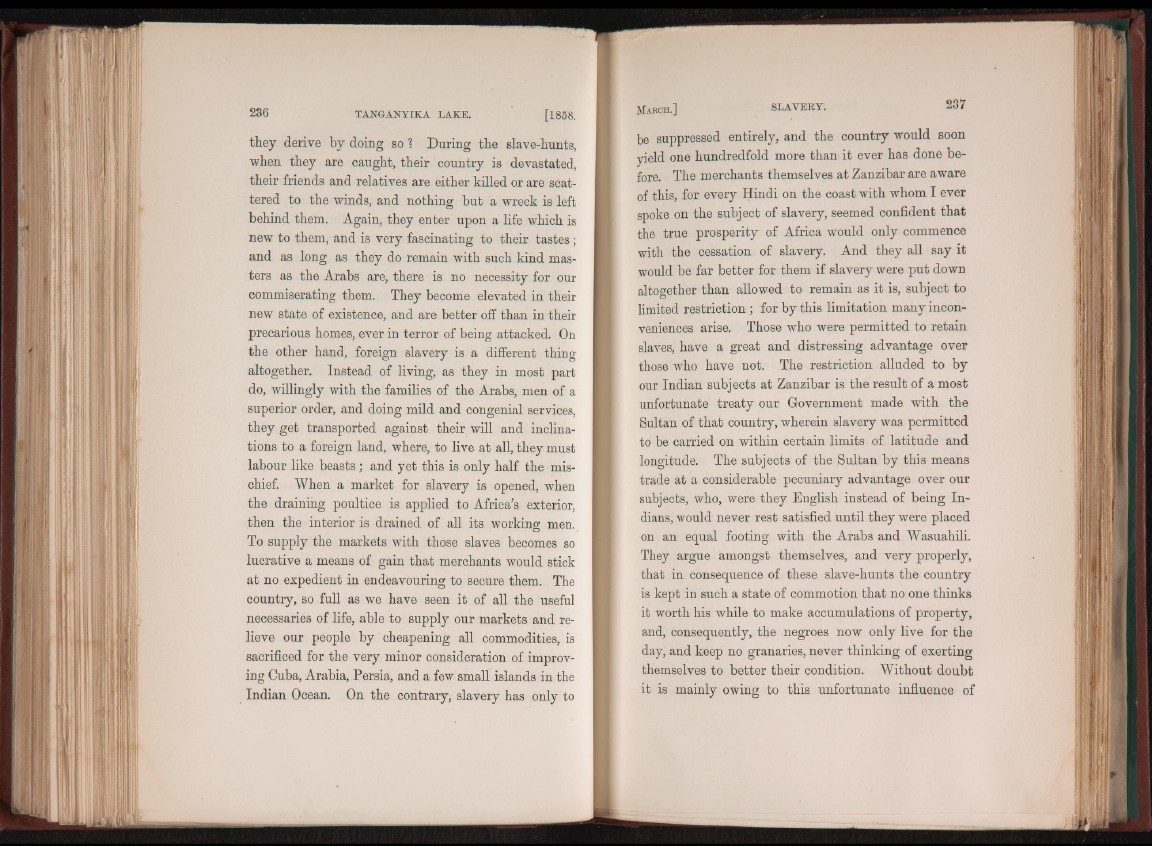
they derive by doing so 1 During the slave-hunts,
when they are caught, their country is devastated,
their friends and relatives are either killed or are scattered
to the winds, and nothing but a wreck is left
behind them. Again, they enter upon a life which is
new to them, and is very fascinating to their tastes;
and as long as they do remain with such kind masters
as the Arabs are, there is no necessity for our
commiserating them. They become elevated in their
new state of existence, and are better off than in their
precarious homes, ever in terror of being attacked. On
the other hand, foreign slavery is a different thing
altogether. Instead of living, as they in most part
do, willingly with the families of the Arabs, men of a
superior order, and doing mild and congenial services,
they get transported against their will and inclinations
to a foreign land, where, to live at all, they must
labour like beasts ; and yet this is only half the mischief.
When a market for slavery is opened, when
the draining poultice is applied to Africa’s exterior,
then the interior is drained of all its working men.
To supply the markets with those slaves becomes so
lucrative a means of gain that merchants would stick
at no expedient in endeavouring to secure them. The
country, so full as we have seen it of all the useful
necessaries of life, able to supply our markets and relieve
our people by cheapening all commodities, is
sacrificed for the very minor consideration of improving
Cuba, Arabia, Persia, and a few small islands in the
Indian Ocean. On the contrary, slavery has only to
be suppressed entirely, and the country would soon
yield one hundredfold more than- it ever has done before.
The merchants themselves at Zanzibar are aware
of this, for every Hindi on the coast with whom I ever
spoke on the subject of slavery, seemed confident that
the true prosperity of Africa would only commence
with the cessation of slavery. And they all say it
would be far better for them if slavery were put down
altogether than allowed to remain as it is, subject to
limited restriction ; for by this limitation many inconveniences
arise. Those who were permitted to retain
slaves, have a great and distressing advantage over
those who have not. The restriction alluded to by
our Indian subjects at Zanzibar is the result of a most
unfortunate treaty our Government made with the
Sultan of that country, wherein slavery was permitted
to be carried on within certain limits of latitude and
longitude. The subjects of the Sultan by this means
trade at a considerable pecuniary advantage over our
subjects, who, were they English instead of being Indians,
would never rest satisfied until they were placed
on an equal footing with the Arabs and Wasuahili.
They argue amongst themselves, and very properly,
that in consequence of these slave-hunts the country
is kept in such a state of commotion that no one thinks
it worth his while to make accumulations of property,
and, consequently, the negroes now only live for the
day, and keep no granaries, never thinking of exerting
themselves to better their condition. Without doubt
it is mainly owing to this unfortunate influence of